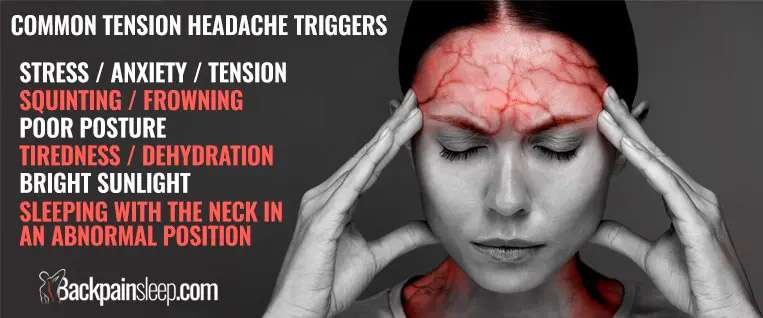Every day, millions of people suffer from tension headaches symptoms. Considered the most common type of headache,
Tension Headaches Symptoms
You may feel a constant ache on both sides of your head. It may feel like your neck muscles are tightening and pressure behind your eyes.
Tension headaches symptoms are not usually severe enough to stop you from doing your daily activities.
It can last from 30 minutes to several hours, but it can also last several days.
Who suffers?
Many people have likely experienced tension headaches symptoms at one time or another.
They can affect anyone at any age, but they are more prevalent in teens and adults.
They are more common in women than they are for men.
Adults can experience them up to 15 times per month for at least three months consecutively.
These are called chronic tension-type headaches.
When should you seek medical assistance?
If you have only occasional symptoms, it is usually not necessary to visit a Doctor.
If you have severe head pain or experience them more than once a week, see your doctor.
To diagnose the type and severity of your headaches, they will ask you questions about your family history, lifestyle, and diet.
Get medical attention if:
- You experience a stiff neck, nausea, vomiting, and confusion.
- Have a headache following an accident, especially if it involved a head injury
- Your headache is accompanied by weakness and numbness, slurred or confused speech, or slurred speech
These symptoms could indicate a more severe problem that may need emergency treatment.

Tension Headaches Cause
Although the exact causes are unknown, specific triggers have been identified.
These include:
- stress, anxiety
- Squinting
- Poor posture
- Tiredness
- Dehydration
- Missing meals
- Lack of physical activity
- Bright sunlight
- Noise
- Certain smells
Primary headaches are also known as tension-type headaches. This means that they don’t have an underlying condition.
Cluster headaches and migraines are also primary headaches.
How can tension headaches be treated?
It’s important to know they are not life-threatening. They can be treated with painkillers and lifestyle changes.
Lifestyle changes
Stress-related occurrences can be relieved by using relaxation techniques.
These could include:
Painkillers
Acetaminophen and ibuprofen are painkillers that can be used to relieve discomfort. Sometimes, aspirin might be recommended.
Follow the instructions on your packet if you are taking these medications.
If you are pregnant, acetaminophen is the best option. Avoid taking ibuprofen while pregnant. Talk to your doctor, midwife, or pharmacist first.
Aspirin should not be administered to children under 16.
Avoid codeine-containing medicine unless a doctor recommends them.
Painkiller headaches
Overuse of painkillers for a prolonged period (typically ten days) can actually lead to head pain.
The body can become accustomed to the medication, and pain can occur if it is stopped.
A Doctor may request that you stop taking certain medicines if you suspect your headaches are caused by chronic use.
However, it would help if you didn’t stop taking your medication without consulting a doctor.
Tension Headache Prevention
You may want to keep a journal if you have frequent tension-type headaches. This will help you identify the underlying cause.
You may be able to change your lifestyle or diet to avoid them happening as often.
Relaxation and regular exercise are important ways to reduce stress and tension that can cause head pain.
Keeping a good posture and staying hydrated can help.
Amitriptyline, an antidepressant medication, may be prescribed in some cases to prevent tension-type headaches. However, there is limited evidence for its effectiveness.
This medicine is not practical for treating a headache immediately. It must be taken daily for several weeks until the headaches subside.




